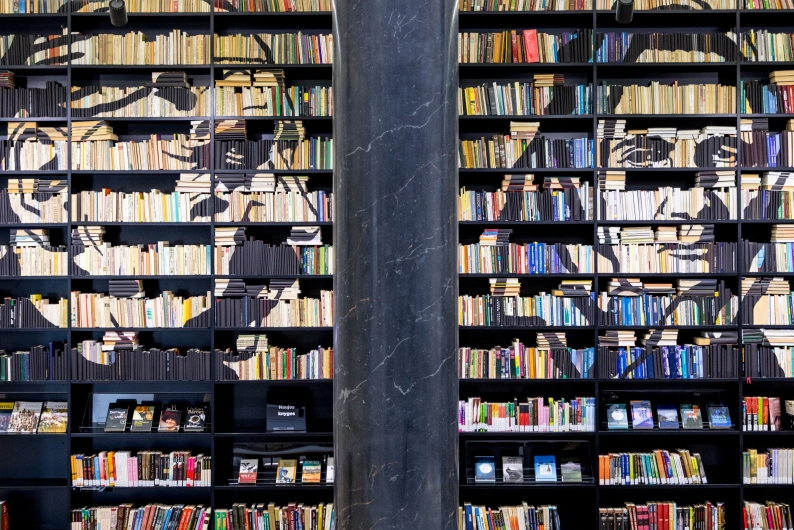 1 January 2020
1 January 2020
“Awakened from books”, an installation by Jolita Vaitkutė
Visit the Martynas Mavydas National Library of Lithuania to observe the installation “Awakened from books” by Jolita Vaitkutė, a younger generation artist.
“Awakened from Books” represents the state’s creators, the nation’s awakeners, writers, and scientists. “It’s like a bridge between history and the present: books are reborn as living history, changing and giving meaning to the space,” says well-known Lithuanian artist J. Vaitkutė.
This time, the artist used the spines of books on the open bookshelves of the National Library to create the installation. By “dressing” each of them, the artist “revived” the bookshelves by creating portraits of eight famous and important figures of the late 19th century national revival and 20th century Lithuania. The poet Bernardas Brazdžionis, the public figure and publicist Gabrielė Petkevičaitė-Bitė, the linguist Jonas Jablonskis, the semiotician and linguist Algirdas Julius Greimas, the scientist and archaeologist Marija Gimbutienė, the philosopher Stasys Šalkauskis, the writer and philosopher Vydūnas, and the novelist and playwright Žemaitė all gaze out at the visitors of the Library.
“I was interested in coming up with a technique that would blend in naturally with the bookshelf. I wanted to keep the same material – paper – throughout the process. This is my first project in which I had to obtain life insurance and overcome my fear of heights. It is very important for me personally that the interior can change and be consistent with the mission it is fulfilling,” says Vaitkutė.
A brief introduction to the individuals commemorated in the installation
- BERNARDAS BRAZDŽIONIS (1907–2002)
- Poet, editor of periodicals, and proponent of freedom. He was one of the first figures in Lithuanian poetry to become part of global cultural contexts, and a forerunner who called on the nation to stay vigilant and fight for freedom and who raised national consciousness. His poems written during the years of exile were reborn in the period of National Awakening: passing from mouth to mouth, they inspired a spirit of national resistance.
- GABRIELĖ PETKEVIČAITĖ-BITĖ (1861–1943)
- Women’s rights and gender equality advocate, public figure, publicist, and writer. She laid foundation for Lithuanian women’s participation in public life, encouraged women to claim equal rights and to fight against constraints imposed by social customs and laws. She advocated on behalf of Lithuanian women on an international scale. She was involved in education, distribution of the banned Lithuanian publications, and charitable activities.
- ALGIRDAS JULIUS GREIMAS (1917–1992)
- Lithuanian linguist, researcher of mythology and essayist who became one of the most prominent semioticians in the world. He was one of the leading figures in the French linguistic revival and a founder of the Parisian school of semiotics. He enriched the general theory of meaning (semiotics) with new concepts, and extended semiotics beyond linguistic texts. He was also a researcher of the ancient Lithuanian belief system and tried to reconstruct Lithuanian mythology.
- JONAS JABLONSKIS (1860–1930)
- Linguist, language standardizer and one of the founders of the standard Lithuanian language. He chose the dialect of the south-western Highland Lithuanian (dialect of Kaunas residents) as the basis for the standard Lithuanian language, established the Lithuanian alphabet, and coined a great number of neologisms. He was the author of one of the best Lithuanian textbooks and published articles on language culture. He initiated the shift of literary language from dialects to the standard language.
- STASYS ŠALKAUSKIS (1886–1941)
- Philosopher, national educator and important figure in the rebirth of national identity. He moved Lithuanian philosophy to a new level and enriched it with new concepts. He promoted national education based on philosophy, and encouraged the cultural advancement of the nation. He established the principles and the core ideology of the Ateitis movement. He also initiated the establishment of the Lithuanian Catholic Academy of Science.
- VYDŪNAS (1868–1953)
- Philosopher, creator of humanist ethics, and prominent figure in the nation's education. He entered the global cultural contexts with his philosophy and literary works. He bridged the Lithuanian humanist thought and the global humanist ideas of the 1st half of the 20th century. He promoted the moral resistance of the awakening nation, its spiritual culture, and critical thought, and encouraged people to become conscious and free citizens.
- ŽEMAITĖ (1845–1921)
- Prose writer, playwright, and pioneer of Lithuanian prose fiction. She introduced the world of peasants, in particularly peasant women, in Lithuanian literature and in this way preserved the experience and oral tradition of people from lower social classes. She was actively involved in the public life of the budding society. She became the symbol of women’s entrance into public life and their departure from the private domestic space.
- MARIJA GIMBUTIENĖ (1921–1994)
- World-class scholar, archaeologist, anthropologist, and a pioneer of archaeomythology. She merged archaeology, linguistics, ethnology, art studies, and the study of religion into a single discipline – archaeomythology and changed the understanding of the prehistory of Europe. She challenged the existing scholarly stereotypes and discovered and described a unique matristic civilization, i. e. Old Europe or the Civilization of the Goddess.
Briefly about the installation
- Date
- until 31 December 2024
- Place
- 3rd floor atrium


 1 January 2020
1 January 2020



